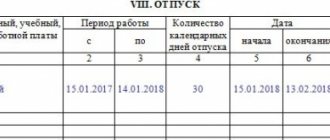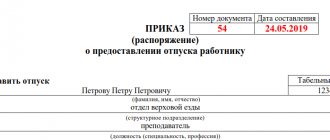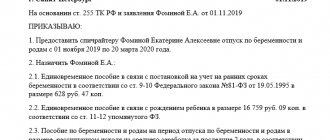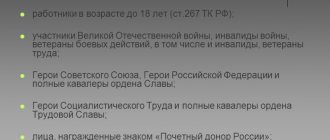Benefits for blood donors in 2021
Donating blood or its individual components is a noble and useful endeavor that should be encouraged in every possible way, including by employers.
In particular, Article 186 of the Labor Code of the Russian Federation obliges the employer to provide so-called donor days.
The donor is given free time to:
- recovery.
- donation;
- preliminary medical examination;
The employer is obliged to provide the donor with three days off due to the act of donating blood.
Sometimes an employee feels able to go to work on the day of blood donation and continue to work; more often than not, he reports to his workplace the next day.
Donor's application for a day of rest
We told in ours who, in accordance with the Labor Code of the Russian Federation, are entitled to additional days of rest.
One category of such workers are blood donors. We will tell you about the specifics of providing them with days of rest in our consultation and provide a form for the corresponding application.
But if the donor went to work on the day of donating blood without agreeing with the employer, the employee will not have the right to demand another day of rest on the day of donating blood (). If an employee donated blood during his annual paid leave, on a day off or a non-working holiday, such employee is given another day of rest at his request ().
Design features
There are certain features when taking time off:
- The employer must pay the employee for rest time. The amount of payment is determined based on data on the average salary of a subordinate for the last period.
- The employee is not required to notify the employer in advance of his intention to donate blood, since such a provision does not exist in the law. In principle, he can simply miss two working days and then show up at work with a certificate from a medical institution. Even if during this time the dismissal procedure for absenteeism was initiated against him, it will be terminated after the certificate is provided. However, it is still recommended to notify the employer about your expected absence and write a statement in advance.
- An employer cannot influence a subordinate in choosing the day to donate blood or the day to take a day off. The right to choose in this case remains entirely with the employee. Management only needs to properly document this procedure.
- The right to time off received for donation is retained by the employee for a limited period. This period is one year - after its expiration it will no longer be possible to receive the required days of rest.
- Time off that is provided for donating blood while working for one employer does not carry over to new employment. The right to receive them is retained only at one workplace. In this case, the period does not matter - even if another year has not passed since the blood donation, the new management is not obliged to release the employee from work.
If at the time of donating blood the employee was on regular paid leave or had a day off, then in the future he can take two days off.
As for replacing time off with monetary compensation, such payment is not provided for in current legislation.
Payment and provision of donor days in 2021
› Currently, for various reasons, more and more citizens have begun to donate blood for medical use.
Biomaterial is extremely necessary for sick people. This is why donation is encouraged by the state. There is currently nothing to replace blood and plasma with.
People are entitled to certain preferences for the donated biomaterial. Let's look at when they are given rest days, how payment for donor days is made in 2021. Everything related to the regulation of the relationship between the employer and the employee-donor is included in the current regulations. Among them are: highlight: Federal Law of July 22, 2012 No. 125-FZ “On the donation of blood and its components.”
Expert opinion
Alekseev Evgeniy Ignatievich
Practicing lawyer with 8 years of experience. Specialization: criminal law. Law teacher. Nikolay
This document defines the financial aspects and also establishes the legal basis for protecting the health of blood donors and its components, recipients and protecting their rights. Order of the Ministry of Health of the Russian Federation No. 364 of September 14, 2001 describes the restrictions associated with blood donation.
Additional day of rest for donor application
Contents: By virtue of Art.
6 of the Law on Donation, the employer is obliged not only to provide the employee who is a donor with social support measures established by law, but also to freely release him to a health care organization on the day of examination and donation of blood and its components.
Along with this, organizations are obliged to provide assistance to state and municipal healthcare organizations in attracting citizens into the ranks of donors, as well as to provide the necessary premises for blood collection free of charge. The measure of social support for donors provided for in Part.
3 tbsp. 186 of the Labor Code of the Russian Federation, is to provide the employee, at his request, with another day of rest in cases where: by agreement with the employer, he went to work on the day of donating blood (with the exception of heavy work and work with harmful and (or) dangerous working conditions, when the employee it is impossible to go to work on this day);
Blanker.ru
The standard procedure for applying for time off for donating blood is as follows: The employee submits an application and, if possible, attaches certificates from a medical organization (these can be provided later) The employer issues a corresponding order and familiarizes the employee with it against signature. The employer will also need to fill out the worker’s report card correctly time.
On its basis, the salary and other payments to the employee are subsequently calculated. Info
Legal subtleties The Labor Code of the Russian Federation in Article 183, as well as the Federal Law “On the Donation of Blood and Its Components” establish certain social guarantees for employees who act as donors. Some additional privileges may also be provided for in the collective agreement and internal local acts of the employing organization.
We issue an order for additional leave
Not a day without instructions × Not a day without instructions
We will understand the intricacies of providing additional rest to donors, Chernobyl victims and military personnel, and also draw up a sample order for donor days, a sample for additional leave for Chernobyl victims.
January 11, 2021 Author: Petrova Natalya Yuryevna Employees of enterprises of various professions are ready to donate blood to help people in need. This desire is laudable and supported by Art.
186 of the Labor Code of the Russian Federation and Federal Law of July 20, 2012 No. 125-FZ. A person has the right not to go to work both on the day of blood donation and on the day of the previous medical examination.
Is the day of blood donation and the corresponding day off paid?
The Labor Code of the Russian Federation guarantees that the day of blood donation, as well as the rest day provided in connection with this, are subject to payment based on the employee’s average earnings (Part 5 of Article 186 of the Labor Code of the Russian Federation).
If the employee only underwent a medical examination, but did not donate blood, he is released from work on that day, but the employee’s average earnings in this case are not accrued.
Please note that payment for the day of blood donation and the subsequent day of rest is made based on the normal length of the working day, i.e. 8 hours. Therefore, if the donor’s rest day coincides with a working day exceeding 8 hours according to the shift schedule, the donor employee will have to work the remaining hours in the subsequent period, taking into account compliance with the annual working time standard (Letter of the Ministry of Labor dated 03/01/2017 No. 14-2/OOG- 1727).
Application for time off
16275 In the legislation of the Russian Federation there is neither the very concept of “time off” nor a documented form of a document called “application for time off”.
Examples of applications for time off: — — — — — — A common situation is when an application for time off is written at the expense of previously worked time. For this case, a sample application has been prepared at the very beginning of the material, and a blank form is also attached: FILES You won’t be able to just take time off - practice shows that usually an employee is obliged to either work an additional day off in advance or subsequently, or take time off towards a future vacation or as leave without pay.
Providing time off to an employee for donating blood
8258 Contents of the page The norms of the legislation of the Russian Federation contribute to the development of donation. This also applies to labor relations standards.
Donors are provided with a number of benefits, which include taking time off on the day of blood donation.
Providing time off for donating blood according to the Labor Code of the Russian Federation is regulated by the following standards:
- Federal Law of June 20, 2012 N 125-FZ (in particular, Article 26 says that the employer is obliged to give its donor employees certain social guarantees).
- Article 186 of the Labor Code of the Russian Federation.
In accordance with these standards, the worker receives rest:
- A day of rest at a time convenient for the employee.
- On the date of blood donation. To confirm donation, a certificate in form No. 402/u is issued.
- On the date of the medical examination of the person.
This examination is mandatory before donating blood.
Among the reasons for receiving additional rest during working hours, donation stands out. If an employee donates blood, plasma, etc., then this procedure may affect general well-being and ability to perform work functions.
Is there an additional day off in this case or not? How to apply for time off for donating blood in order to quickly receive it?
- 1 Right to time off for donation
- 2 When can you take a day off?
- 3 How to write a statement correctly?
- 4 Writing example
Right to time off for donation
Article 186 of the Labor Code of the Russian Federation proclaims the donor’s right to receive additional rest periods, regardless of the fact that they fall on working days. At the same time, the employee’s salary for these days is maintained at the average value, and management is obliged to pay for them.
- undergoing medical tests and examinations before the blood donation procedure. Initially, doctors study and analyze some indicators of a potential donor’s blood for the possibility of its use;
- the day of blood donation;
- the day after the procedure.
The legislation protects the employee’s rights to receive additional rest for donation and provides the opportunity to choose the appropriate period if a transfer is necessary.
When can you take a day off?
The legislation clearly defines the periods during which an employee is entitled to receive time off. On the day of undergoing a medical examination and directly donating blood, everything is obvious.
The employee must be absent from the place of work, since the procedures are carried out in a medical institution. However, even on these days, the interested party and the manager can agree to go to work if necessary.
In this case, the time off is transferred to a period when it is convenient for the employee to use it. The interested person has the right to use the day following the procedure either immediately or later. What is important here is his personal desire and well-being.
Expert opinion
Alekseev Evgeniy Ignatievich
Practicing lawyer with 8 years of experience. Specialization: criminal law. Law teacher. Nikolay
In addition, if this period falls on a weekend or holiday, then the donor’s right to take time off during working hours does not expire. The interested party can expect to receive the required day of rest later.
The employer is obliged to provide the donor with the rest periods required by law. If an employee is engaged in harmful and dangerous work, then the transfer is unacceptable.
Who can be a donor?
Any citizen who meets the following requirements has the right to provide blood or its components for medical, scientific and educational purposes of their own free will:
- capacity;
- citizenship of the Russian Federation or foreign, if the person has been in the territory of our country for more than a year in the manner prescribed by law;
- There are no contraindications for the procedure due to health reasons.
Body check
Before donating blood, the donor must undergo an examination to identify pathologies, diseases and other risk factors that may become contraindications.
The rules for conducting are established by regulations:
- carried out in medical institutions that collect, process and store blood;
- if the donor and recipient are the same person, then an examination is not necessary;
- The citizen is sent to the procedure if the examination is successfully completed.
Documentation
In accordance with the procedure established by the legislation of the Russian Federation, upon passing the examination and donating blood, a medical certificate is issued in free form with the stamp of the organization. All benefits provided to donors are provided only after presentation of the appropriate paper.
How to write an application correctly?
The donor will have to fill out an application for time off if it is postponed to another day.
The rules for writing a document require the following information to be included:
- Full name of the director, manager or other official;
- Business name;
- Full name of the employee and his position;
- request to provide an additional day of rest, indicating the date and reason;
- signature;
- date of application.
Once completed, the application must be submitted to management for approval. The employer must not refuse to provide the donor with rest. However, the parties may agree among themselves to choose a different period if the employee is needed on site at that time.
By virtue of Art. 6 of the Law on Donation, the employer is obliged not only to provide the employee who is a donor with social support measures established by law, but also to freely release him to a health care organization on the day of examination and donation of blood and its components.
Along with this, organizations are obliged to provide assistance to state and municipal healthcare organizations in attracting citizens into the ranks of donors, as well as to provide the necessary premises for blood collection free of charge.
The measure of social support for donors provided for in Part 3 of Art. 186 of the Labor Code of the Russian Federation, is to provide the employee, at his request, with another day of rest in cases where:
- by agreement with the employer, he went to work on the day of donating blood (with the exception of heavy work and work with harmful and (or) dangerous working conditions, when the employee’s going to work on this day is impossible);
- the day of donation of blood and its components coincided with the period of annual paid leave, a day off or a non-working holiday.
The donor's body requires restoration, therefore the legislator guarantees the employee an additional day of rest after the day of blood donation (Part 4 of Article 186 of the Labor Code of the Russian Federation). At the request of the employee, this day can be added to annual paid leave or used at other times during the year after the day of donation of blood and its components.
If the days of blood donation fell on weekends, the employee must be provided with four other days of rest at his request in the case under consideration. Time off must be agreed upon with the employer. Their unauthorized use is not permitted and entails the possibility of disciplinary action up to and including the dismissal of the employee.
As for the four days allotted to the donor as additional days of rest, at the request of the employee they are added to the annual paid leave by virtue of the direct instructions of the law, and the employer has no right to prevent this.
In order to protect the rights and legitimate interests of the employer and employees, it seems appropriate to provide in the Internal Labor Regulations norms of conduct for employees donating blood and its components.
In particular, it would be rational to determine the procedure for providing an employee with an additional day of rest by establishing:
1) the employee’s obligation to provide:
- a document confirming the donation of blood and its components;
- a written application for an additional day of rest indicating a specific date;
- submission to the employer of a document confirming that the employee donated blood and its components;
- submitting an application to the employer regarding the time of using an additional day of rest at the request of the employee.
It is advisable to include in the Internal Labor Regulations in the form of information conditions:
- possible options for an employee to use rest time for donating blood and its components;
- rules limiting the employee’s right to use an additional day of rest by calendar period.
The definition of such conditions can in some way orient workers regarding the rules for implementing legal guarantees, as well as assist in protecting the interests of the employer.
If an employee of an organization donates blood as a donor, then there are several options for his further behavior. He may show up for work immediately after submitting the material, or not show up for two days.
In accordance with this, there are several options for documenting such situations. Let's look at how to arrange rest days for a blood donor in four different situations.
- The employee came to work after delivery
- The employee did not show up for work on the day of delivery
- The donor employee came to work only after rest
- The employee went to work, but plans to use the day off another time
- How to arrange rest days for a blood donor
- The legislative framework
How to apply for release from work while maintaining pay
The management of the company in which the donor is employed has to solve several problems at once to provide all the guarantees approved by law. It is necessary to correctly take into account, pay for and fill out all the necessary paperwork related to additional days off and periods when the employee had the right to rest, but performed his duties.
Time off on donor day
To correctly implement such a benefit, you need to adhere to the following algorithm:
- the subordinate submits a corresponding statement;
- the authorized person signs an order to relieve the employee of direct duties on the specified date;
- a note is made on the working time sheet indicating absence due to the performance of public duties.
If an employee has not reported his intention to donate blood in advance, then an absence due to unclear circumstances is recorded for that day.
And then, after receiving a certificate confirming a good reason, an order is drawn up to maintain average earnings.
The manager has the right to take time off without pay if the submitted documents contain information about undergoing a medical examination, but there is no justification for the performance of donor functions.
Sample application
The request for an unscheduled day off is drawn up in any form and may look like this:
Application for time off for donation
Work instead of rest
In regulatory documents there is only one prohibition on work during the period of blood collection - these are harmful or dangerous conditions. In any other case, it is permitted to begin one’s duties by agreement of the parties.
You can register non-use of the prescribed rest day as follows:
- depending on the direction of the initiative, either the employee submits a corresponding application, or the employer draws up a notice;
- the manager issues and signs an order on the employee’s performance of labor functions during the designated period.
Important! Time off must be granted at another time at the employee's discretion.
Additional days off
So, the donor has the right to two days of rest associated with the collection procedure:
- directly at the time of delivery or any other at the discretion of the employee;
- additional time off, which can be added to the next vacation, provided as a social guarantee.
The law prohibits the management of the organization from determining the period for using such days off. The subordinate independently selects the desired date and draws up an application .
Based on the received paper, it is necessary to issue an order indicating:
- dates of accrual;
- payment method;
- reasons for providing benefits.
The report card indicates that during the designated period it was issued as an additional paid day off.
The employee came to work after delivery
Let's consider a situation where an employee, after donating blood, came to work and provided a certificate of release from work for that day. In addition, he applies for additional rest the next day. Here is a sample of such a statement.
To such an application, the employee must attach a certificate issued to him by a medical institution confirming that on that day he donated blood and its components.
Important! It is impossible to force an employee to warn about his intention to donate blood and apply for additional rest.
After the employee has written a statement, the employer puts a resolution on it and transfers the document to the personnel department. Based on this application, an order is issued to provide a day for rest to the donor, as well as payment for such a day based on the amount of average earnings (186 Labor Code of the Russian Federation). The order is presented to the employee against his signature.
The donor employee must be given two days off - on the day of delivery and an additional one - on the next day. In this case, an additional day of rest can be added to the employee’s vacation if desired.
conclusions
There are several main points:
- When a person does not warn the employer about absenteeism and brings a donor certificate indicating that blood was drawn that day, it will not be possible to fire him for absenteeism.
- Filling out an application for blood donation is not considered a mandatory document, but it is recommended to write it in order to prevent conflict and maintain correct document flow in the enterprise.
- A person acting as a donor has the right to count on a day off on the day of blood donation and additional time off for each blood donation.
- It is possible to coincide a day of rest with annual leave on the initiative of the employee himself.
- You can get a day off when taking blood from a donor on a weekend or holiday.
- The day off due for donation is subject to payment in the amount of the applicant's average daily income.
The donor employee came to work only after rest
A different situation arises when an employee is absent from work for two days - on the day of the blood donation and the next day. After this, he presents a certificate stating that he donated blood as a donor].
In this case, the employee will also not violate labor laws. And for the employer this is the easiest option to apply for.
Expert opinion
Alekseev Evgeniy Ignatievich
Practicing lawyer with 8 years of experience. Specialization: criminal law. Law teacher. Nikolay
Due to ignorance, the reason for the employee’s absence from work is indicated on the report card for two days. After the employee provides a certificate of donation, adjustments will need to be made to the timesheet.
Based on these adjustments, the employee will be paid for such rest days. The employer does not even need to issue an order, since there is no need to do this retroactively, and the employee has already used the allotted day for rest.
An employee can also donate blood during his vacation, or on a weekend or non-working holiday. For example, he donated blood during his vacation, and left it only after it ended two days later. The employee is also not obliged to warn about this; the main thing is that he provides the appropriate certificate upon returning to work.
If the employee is a donor
For citizens who decide to become donors of blood and its components, legislators have provided a number of guarantees (Article 186 of the Labor Code of the Russian Federation).
First of all, the donor employee is released from work on the day of delivery. The employer must also release him on the day of the medical examination. In addition, the donor is entitled to one additional day of rest.
Other “bonuses” are provided for honorary donors.
For example, the employing organization is obliged to provide annual paid leave at a time of year convenient for them, and must also offer them to buy vouchers for sanatorium and resort treatment first (Clause 1, Article 23 of the Federal Law of July 20, 2012 No. 125-FZ “ On the donation of blood and its components").
Let’s figure out how and on the basis of what documents an accountant should document the absence of an employee on the day of blood donation, the associated medical examination and additional day of rest, what salary to accrue for these days and what taxes to withhold from it.
FOR REFERENCE
Federal Law No. 125-FZ of July 20, 2012 “On the donation of blood and its components” establishes that the “Honorary Donor of Russia” badge is awarded to donors who donate free of charge:
- blood and (or) its components (except for blood plasma) 40 or more times;
- or blood and (or) its components 25 or more times and blood plasma in the total amount of blood and (or) its components and blood plasma 40 times;
- or blood and (or) its components less than 25 times and blood plasma in the total amount of blood and (or) its components and blood plasma 60 times or more;
- or blood plasma 60 or more times.
Medical examination day
Before donating blood, the future donor must undergo a medical examination. The Labor Code of the Russian Federation establishes the obligation of the employer to provide an employee with a day to undergo a medical examination in connection with further donation of blood and its components (paragraph 1 of Article 186 of the Labor Code of the Russian Federation). Many people know that on the day of donating blood an employee retains an average salary (paragraph 5 of Article 186 of the Labor Code of the Russian Federation), but there are cases when an employee did not pass a medical examination, which means he did not donate blood that day. The code does not say anything about the fact that the employee in this case retains his average earnings. Therefore, most employers do not pay future donors a salary for the day of undergoing a medical examination (without donating blood). However, there is a cassation ruling of the St. Petersburg City Court dated April 16, 2012 No. 33-4615/12, in which the court sided with the donor employee and indicated that the organization was obliged to pay the average salary for the day of undergoing a medical examination to donate blood.
- BRIEFLY
Details of the decision: Cassation ruling of the St. Petersburg City Court dated April 16, 2012 No. 33-4615/12. On the cancellation of the decision of the lower court to pay the donor employee the average salary for the day of undergoing a medical examination.
Arguments of the applicant (OJSC): On the day of the medical examination, the employee did not donate blood, which means, in accordance with Art. 186 of the Tax Code of the Russian Federation, he does not have the right to receive the average salary for that day.
The court decided: Blood donation is inextricably linked with undergoing a medical examination; without a medical certificate stating that there are no contraindications to donation, the donor cannot be allowed to take blood; undergoing a medical examination is the responsibility of the donor.
Since, without an appropriate medical examination, the plaintiff could not be allowed to draw blood, and was not able to fulfill the donor obligation, as a result of which, by virtue of the provisions of Art. 186 of the Labor Code of the Russian Federation, during the specified period, she retains the average earnings at her place of work.
Confirmation that the employee has undergone a medical examination will be a certificate from a medical institution in form No. 401/u (approved by Order of the USSR Ministry of Health dated August 7, 1985 No. 1055 “On approval of forms of primary medical documentation for blood service institutions”, hereinafter referred to as Order No. 1055).
FORM
Form No. 401/у “Certificate to donor about examination”
Other forms
The Labor Code of the Russian Federation does not provide for the obligation of an employee to notify the employer in advance of his intention to undergo a medical examination and donate blood. Therefore, a situation may arise that the employee does not show up for work, but brings the certificate the next day. In this case, the organization does not have the right to punish the employee, because this is not considered absenteeism. When filling out a work time sheet (unified forms No. T-12, No. T-13, approved by Resolution of the State Statistics Committee of Russia dated January 5, 2004 No. 1 “On approval of unified forms of primary accounting documentation for recording labor and its payment”, hereinafter - Resolution of the State Statistics Committee) on the day of absence of an employee, you must enter the code “NN” or “30” - failure to appear for unknown reasons (until the circumstances are clarified). After the employee has provided a certificate, the time sheet must be corrected and coded “G” or “23” must be entered - absence from work while performing state or public duties in accordance with the law. Corrections are confirmed by the signature of the employee who filled out the form, and are also agreed upon and signed by all persons responsible for the contents of the document.
FORM
Time sheet and calculation of wages (Form No. T-12) (in A4 and A3 formats)
Time sheet (Form No. T-13) (in A4 and A3 formats)
Other forms
However, in order to avoid controversial situations or the need to adjust the work time sheet, it is possible to stipulate in a local regulatory act (for example, in the internal labor regulations) the obligation of employees in advance (for example, two to three working days) to notify the employer in writing of their intention to undergo medical examination in connection with the donation of blood and its components.
Blood donation day
FOR REFERENCE
The procedure for making changes to the work time sheet is not regulated by the Resolution of the State Statistics Committee. Therefore, when adjusting the timesheet, you should be guided by the general rules for primary accounting documentation (Regulations on documents and document flow in accounting, approved by the USSR Ministry of Finance on July 29, 1983 No. 105 in agreement with the Central Statistical Office of the USSR, hereinafter referred to as the Regulations). In accordance with clause 4 of the Regulations, errors are corrected as follows: “the incorrect text or amounts are crossed out and the corrected text or amounts are written above the crossed out. Crossing out is done with one line so that the correction can be read. Correction of an error in the primary document must be indicated by the inscription “Corrected”, confirmed by the signature of the persons who signed the document, and the date of correction must be indicated.”
Often the donor donates blood on the same day as the medical examination, but it is much more convenient to do it differently. Pass a medical examination on the first day
On this day, the employee has every right not to come to work, and the employer must pay him based on average earnings. Moreover, the donor is not obliged to notify the employer in advance of his intention and agree on the day of blood donation; however, in order to avoid misunderstandings, it is better to write an application for granting him a “donor” day in any form. In this case, a corresponding order will be issued, which the future donor must familiarize himself with under signature.
If an employee, by agreement with the employer, went to work on the day of blood donation, then he is given another day of rest at his request. The only restriction is that if the donor works at work with dangerous or harmful working conditions, then he has no right to work on the day of blood donation. Such a prohibition is expressly stated in paragraph. 2 tbsp. 186 Labor Code of the Russian Federation.
Since the code indicates that the employee changes the day of rest at his own request, the donor will need to notify the employer about this - write a statement in any form.
SAMPLE
Sample application for a day of rest to donate blood
Sample order to provide a day of rest for donating blood
Other samples
There is another option when the employer asks the employee to go to work on the day of donating blood due to production needs. To do this, you need to obtain the employee’s consent, and it is better in writing, for example, by drawing up an agreement asking the employee to go to work (paragraph 2 of Article 186 of the Labor Code of the Russian Federation). The form of such an application is not provided for by law, so it is drawn up in any form.
If an employee donates blood during his annual paid leave, on a weekend or a holiday, then in this case he has the right to take another day of rest by writing a similar statement. For example, an employee can extend his vacation by adding an additional day to his vacation, but even in this case he cannot do without an application.
SAMPLE
Sample application for a day of rest instead of a day of blood donation
Sample agreement to return to work
Other samples
Confirmation that the employee donated blood will be a certificate issued by the medical institution that performed the procedure, according to form No. 402/u (approved by Order No. 1055).
The working time sheet is filled out depending on the situation:
- if the employee warned in advance about his intention to donate blood (i.e., wrote a corresponding statement), then on the day of donation the code “G” or “23” is entered in the report card;
FORMForm No. 402/u “Certificate to the donor about release from work on the day of blood donation and providing him with an additional day of rest”
Other forms
- if the employee did not write an application for a day of rest, did not warn the employer in advance and did not show up for work on the day of blood donation, then first you need to enter the code “NN” or “30” in the report card, and then after the employee provides certificate No. 402/u adjust to code “G” or “23”;
- if an employee went to work on the day of blood donation, then for this day in the report card you need to enter the classic “I” or “01” - work during the daytime, and for the rest day for which the donor wanted to change his day of blood donation, you need to enter the code “OV” or “27” – additional days off (paid).
After each day of donating blood, the donor is given an additional day of rest, which is also paid based on the employee’s average earnings. An employee, at his own discretion, can take it directly after the donor day, add it to annual paid leave, or use it at other times during the year after the day of blood donation (paragraph 4 of Article 186 of the Labor Code of the Russian Federation).
SAMPLE
Sample application for an additional day of rest
Other samples
In the last two cases, the employee must write an application for an additional day of rest in any form.
You must enter the code “OB” or “27” in your time sheet.
Taxes on “donor” wages
Personal income tax
The Tax Code of the Russian Federation establishes a list of tax-free income (Article 217 of the Tax Code of the Russian Federation). But it is closed, and the salary paid for the days of donation, passing a medical examination and additional rest in connection with this is not named there. This means, in accordance with Art. 210 of the Tax Code of the Russian Federation, it is taxed. The Russian Ministry of Finance shares the same opinion. He spoke about this more than once in his letters (letter of the Ministry of Finance of Russia dated July 6, 2009 No. 03-04-05-01/530, letter of the Ministry of Finance of Russia dated May 5, 2009 No. 03-04-06-01/110) .
Insurance contributions According to the general rule, payments to an employee are subject to insurance contributions (Part 1, Article 7 of the Federal Law of July 24, 2009 No. 212-FZ “On Insurance Contributions to the Pension Fund of the Russian Federation, the Social Insurance Fund of the Russian Federation, the Federal Compulsory Medical Insurance Fund ", hereinafter referred to as Law No. 212-FZ). However, until recently, the courts took a different position (Resolution of the Federal Antimonopoly Service of Moscow Region dated February 28, 2013 No. F05-769/13, Resolution of the Federal Antimonopoly Service dated November 26, 2010 No. A65-9880/2010). They believed that payment to the donor of the average salary for the day of undergoing a medical examination for donating blood, the “donor” day itself and the subsequent additional day of rest should not be subject to insurance premiums. After all, these payments are not part of the wage system for donor employees, but are made by the employer by force of law, regardless of the presence or absence of relevant provisions in the employment contract, collective agreement or agreement.
But recently the Supreme Arbitration Court of the Russian Federation made a different decision (Resolution of the Presidium of the Supreme Arbitration Court of the Russian Federation dated May 13, 2014 No. 104/14). Since payment of average earnings by the employer is possible only if there is an employment relationship between the employee and the organization, such payment must be subject to insurance contributions.
- BRIEFLY
Details of the decision: Resolution of the Presidium of the Supreme Arbitration Court of the Russian Federation dated May 13, 2014 No. 104/14. On the need to impose insurance premiums on the average earnings paid for the day of blood donation and the subsequent day of additional rest.
Arguments of the applicant (Office of the Pension Fund of Russia): the object of taxation of insurance premiums for organizations and individual entrepreneurs are payments and other remuneration accrued in favor of individuals within the framework, in particular, of labor relations.
The court decided: According to the provisions of Art. 186 of the Labor Code of the Russian Federation, an employee is released from work on the day of donating blood and its components; after each day of donating blood and its components, the employee is given an additional day of rest, while his average earnings are retained. The legislative establishment of the provision that the employee in the mentioned cases retains his average earnings means that wages are paid for the day of donation of blood and its components and the day of rest after that. The employer makes such payments on the basis of the law, regardless of the presence or absence of relevant provisions in the employment contract, collective agreement or agreement.
These payments are included in the list of amounts not subject to insurance premiums, defined in Art. 9 of Law No. 212-FZ, not included.
Payment of average earnings to an employee by an employer in connection with the presence of provisions provided for in Art. 186 of the Labor Code of the Russian Federation, circumstances are possible only if there is an employment relationship between the employee and the employer, which, by virtue of Part 1 of Art. 7 of Law No. 212-FZ implies the inclusion of the said payment in the object of taxation of insurance premiums.
A similar legal position applies in the case of calculating contributions for compulsory social insurance against accidents at work and occupational diseases (Resolution of the Presidium of the Supreme Arbitration Court of the Russian Federation dated September 13, 2011 No. 4922/11).
Income tax Payments of average earnings for “donor” days, days of medical examination and additional rest come from the wage fund and are included in expenses that reduce the tax base for income tax. As for the opinion of the Russian Ministry of Finance, it supports this position (letter of the Russian Ministry of Finance dated August 18, 2009 No. 03-03-06/2/154)
***
Thus, if your employee did not go to work for two days in a row, and then brought a certificate from a medical institution about donating blood, then you will not be able to fire him for absenteeism, nor punish him for not coordinating the days with management. The employee had every right to do so. And all that remains for the employer is to adjust the time sheet, charge the donor the average salary for two days of absence and calculate taxes on it.
Related documents:
- Labor Code of the Russian Federation
- Tax Code of the Russian Federation
- Federal Law of July 20, 2012 No. 125-FZ “On the donation of blood and its components”
- Federal Law of July 24, 2009 No. 212-FZ “On insurance contributions to the Pension Fund of the Russian Federation, the Social Insurance Fund of the Russian Federation, the Federal Compulsory Medical Insurance Fund”
- Resolution of the State Statistics Committee of Russia dated January 5, 2004 No. 1 “On approval of unified forms of primary accounting documentation for recording labor and its payment”
- Order of the USSR Ministry of Health of August 7, 1985 No. 1055 “On approval of forms of primary medical documentation for blood service institutions”
- Regulations on documents and document flow in accounting, approved. Ministry of Finance of the USSR July 29, 1983 No. 105 in agreement with the Central Statistical Office of the USSR
- Resolution of the Presidium of the Supreme Arbitration Court of the Russian Federation dated May 13, 2014 No. 104/14
- Resolution of the Presidium of the Supreme Arbitration Court of the Russian Federation dated September 13, 2011 No. 4922/11
- Resolution of the Federal Antimonopoly Service of the Moscow Region dated February 28, 2013 No. F05-769/13
- Resolution of the Federal Antimonopoly Service dated November 26, 2010 No. A65-9880/2010
- Cassation ruling of the St. Petersburg City Court dated April 16, 2012 No. 33-4615/12
- Letter of the Ministry of Finance of Russia dated August 18, 2009 No. 03-03-06/2/154
- Letter of the Ministry of Finance of Russia dated July 6, 2009 No. 03-04-05-01/530
- Letter of the Ministry of Finance of Russia dated May 5, 2009 No. 03-04-06-01/110
Related news:
- Honorary donors may be given back the right to choose between a cash payment or a set of social support measures - GARANT.RU, June 20, 2014.
- The Moscow government has issued a decree on supporting blood donors - GARANT.RU, February 13, 2013.
The employee went to work, but plans to use the day off another time
An employee may not use his additional day off immediately, but at another convenient time. He can use it in conjunction with annual leave or at other convenient times.
Important! Within a year after donating blood, the employee must use his additional day off.
In this case, writing an application is also not required, however, in order to use your day off in the future, you still need to write an application. An employee can independently determine a day of rest, but it is better to notify his employer about this in writing.
How to Write an Application for Donor Days Sample
Solution. The employer needs to issue a separate order to add additional days of rest after donating blood to the annual paid leave (sample 3 on p. 92).
If the employee has worked the billing period in full, the average daily earnings are determined by dividing the amount of salary actually accrued for the billing period by 12 and by the average monthly number of calendar days (29.3).
An employee’s application to add an additional day of rest to the annual paid leave (read more...)
How to arrange rest days for a blood donor
Thus, the procedure by which days of rest are issued to the donor is not precisely defined. The design will depend on how exactly the employee uses his additional days off. The employer cannot influence the employee’s choice; he only must take into account how the employee manages his days off when preparing the documents.
For example, if an employee can apply for additional leave only within a year from the date of blood donation. In this case, the employee will no longer be able to attach a certificate of donation, since he has already presented it to the employer earlier.
But in the application, the employee can refer to this certificate. Here is a sample application for such a case (
Are there days off for donating?
Art. 186 of the Labor Code of the Russian Federation establishes an obligation for organizations to release a person from their place of work on the day of blood donation.
Additionally, after the day of collection, there is another day of rest.
It can be used immediately or at any other time, as well as attached to annual paid leave.
Like other days off, rest days based on a donor certificate are paid according to average earnings.
The average salary of a donor is 700 rubles. The donor rested for two days: on the day of collection and the next day. For them he will receive 700 * 2 = 1400 rubles.
Writing example
A sample application for time off based on a donor certificate can be used by the enterprise itself. If the form is developed individually and accepted as standard by the employer, then the document should be drawn up in accordance with it. For example, you can see the following example:
Statement
Expert opinion
Gusev Pavel Petrovich
Lawyer with 8 years of experience. Specialization: family law. Has experience in defense in court.
Please give me one day of rest on 10/04/2019, since I donated blood on 09/23/2019 and did not use the next day as time off entitled to me under Art. 186 Labor Code of the Russian Federation. A copy of the medical certificate is attached.
Rudakov M.N. 01.10.2019
As a result, the employee has the right to receive days off paid at the average salary for donation. The law allows them to be transferred to other periods if necessary. However, those employed in hazardous work will have to use all the rights associated with donation immediately.
This is necessary to ensure the safety of the person concerned who may feel weak after a medical procedure. If it is necessary to reschedule time off, the employee draws up an application in the form accepted by the enterprise.
Is it necessary to write to the employer?
Expert opinion
Alekseev Evgeniy Ignatievich
Practicing lawyer with 8 years of experience. Specialization: criminal law. Law teacher. Nikolay
Donating blood in the form of donation is always a valid reason for a person’s absence from the place of work. Despite the fact that the company will have difficulties, the day of donating blood cannot be equated to absenteeism (with a supporting certificate).
Important! The law does not establish an obligation to notify the employer of absence from work.
If an employee has not notified the company's management, it will not be possible to fire him under absenteeism.
People are also interested in whether donors have an obligation to write an application for time off (an extra day) when drawing blood.
The law states that taking rest days after each day of donating blood will not be considered absenteeism if the employer refuses to provide them.
It turns out that a person must inform the management at his place of work about his intention to take the allotted time off.
It is not stated anywhere whether this must be done orally or in writing. But every person understands that “words cannot be applied to deeds.” Accordingly, it is better to notify the employer in writing.
The form of such a notification or statement is not approved by law.
Accordingly, even an SMS message from a phone can be taken as evidence (it can serve as documentary evidence).
An example is one of the court's rulings. The employee sent an SMS message to the employer stating that he was donating blood, and would use the additional day of rest according to the donor certificate immediately the next day. The court representative considered that such notice was sufficient and reinstated the employee at work after illegal dismissal for absenteeism.
When an additional day of rest is not immediately used by an employee, it must be agreed upon with the employer.
Important! In order not to argue with the employer, it is recommended to submit an application for time off for donating blood in writing.
An application with an attached donor certificate will become the basis for issuing an order for time off and payment for time off. The presence of an application will preserve the correctness of document flow in the enterprise.
Validity period of the donor certificate
If the additional day of rest for donating blood is not used immediately, it must be agreed upon with the employer. Then the application must be written.
To avoid difficulties and conflicts with the employer and not to bring the matter to court, it is recommended to write an application for time off in advance, at least one day in advance.
The employer still has no right to refuse, but the employee will have peace of mind that he has officially notified the company of his absence. The main thing is to write the application in 2 copies, on the second the employer must put an acceptance mark.
The limitation period for a donor certificate is valid for one year, since you can only receive one day a year for each blood donation.
If there is a donor certificate, the employee has the right not to notify the organization in advance about donating blood; he can come with this document and simply confirm that his absence is excused. Usually this happens the next business day.
How to apply?
At the legislative level, there is no unified form for an application of this type. However, it is recommended to include the following mandatory items:
- Header: in whose name the document is written;
- Who wrote the document: Full name and position.
- request to provide time off on a certain day;
It can be written by hand or printed on a computer.
The document can be prepared in free form. The main thing is that the basic data is clear: who, when and on what basis the employer should let go.
Based on the application, the organization issues an order. After the document is received by the accounting department, the employee is given time off with pay based on average earnings.
Procedure for taking time off
The specifics of taking time off depend on the following factors:
- Blood donation day.
- The employee's wishes regarding the date of the day off.
- The nuances of the employee’s work activity.
The traditional procedure for taking time off is the following:
- Submission of an application by an employee for time off in connection with blood donation . You need to put a resolution on paper.
- Drawing up an order for release from work . It is important to indicate the exact date of leave in the order. The employee must be familiarized with this document against signature.
- Obtaining certificates of the established form from the employee . They must confirm a valid reason for the person’s absence from the workplace.
- Putting marks on time sheets. The marks will depend on the specific situation.
Registration of such time off differs in a number of nuances. Let's take a closer look at them.
IMPORTANT! The employee is not required to notify the employer that he will be absent from his place of duty in connection with donating blood. The employee may well come after 2-3 days. If he confirmed the fact of donating blood with certificates of the established form, the employer does not have the right to fire him.
Example of an application for time off
To the General Director of JSC Prodvizhenie From project manager Ivanov I.K.
statement.
I ask you to give me a day off on June 16 in connection with donating blood as a donor with a previous medical examination and an additional day off on June 17 on the basis of Article 186 of the Labor Code of the Russian Federation.
Date and signature.
IMPORTANT! There is no need to write a statement if an employee visits a blood donation station on a day off.
Example of a leave order
JSC "Prodvizhenie"
Order No. 15 On release from work on June 15, 2021.
In accordance with the provisions of Article 186 of the Labor Code and based on the statement of a specialist, I order:
Release project manager I.K. Ivanov from work on June 16, 2021. in connection with blood donation and medical examination.
Date and signatures of the parties.
The employee must put his signature on the order to confirm familiarization with the document.
FOR YOUR INFORMATION! In this case, no special requirements are imposed on the order. It can be compiled in free form. However, it is important to indicate the date of leave in the document.
Making marks on the report card
Let's look at the nuances of putting marks on the time sheet:
- If the employee did not notify the boss about the time off and came only after donating blood, at the time of his absence they are given a “30”. This is due to the fact that the employer does not know the reasons for the employee’s absence. After the employee provides all the relevant certificates, you need to correct “23”.
- If an employee goes to work immediately after donating blood and does not use his right to a day off, he is marked “I”.
- If an employee uses the right to a deferred day off, he must enter o and “OB”.
IMPORTANT! Related marks are placed only on the basis of official papers - certificates of the established form.











